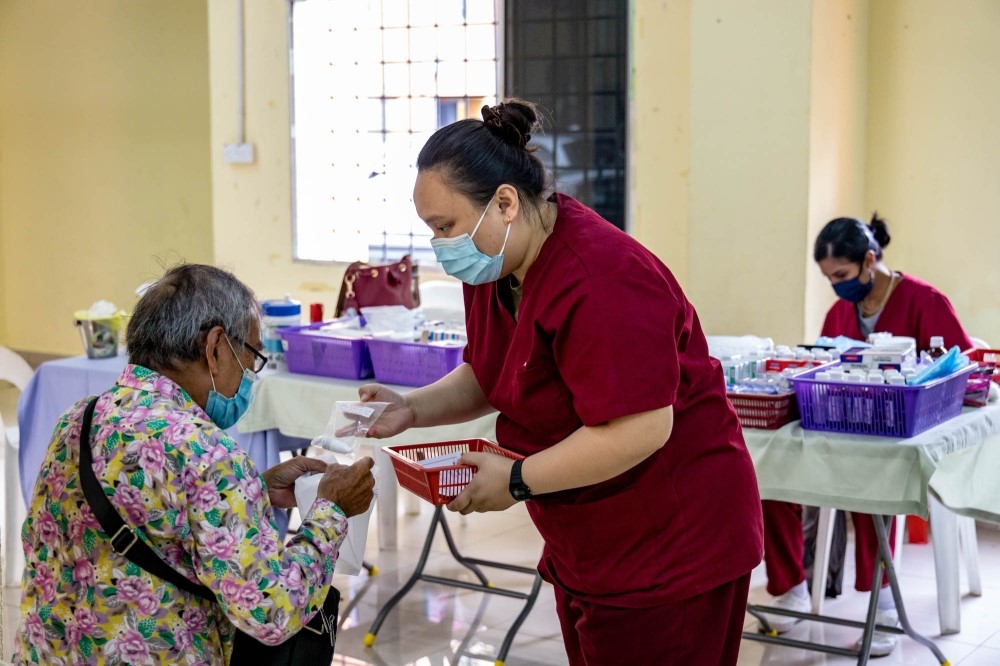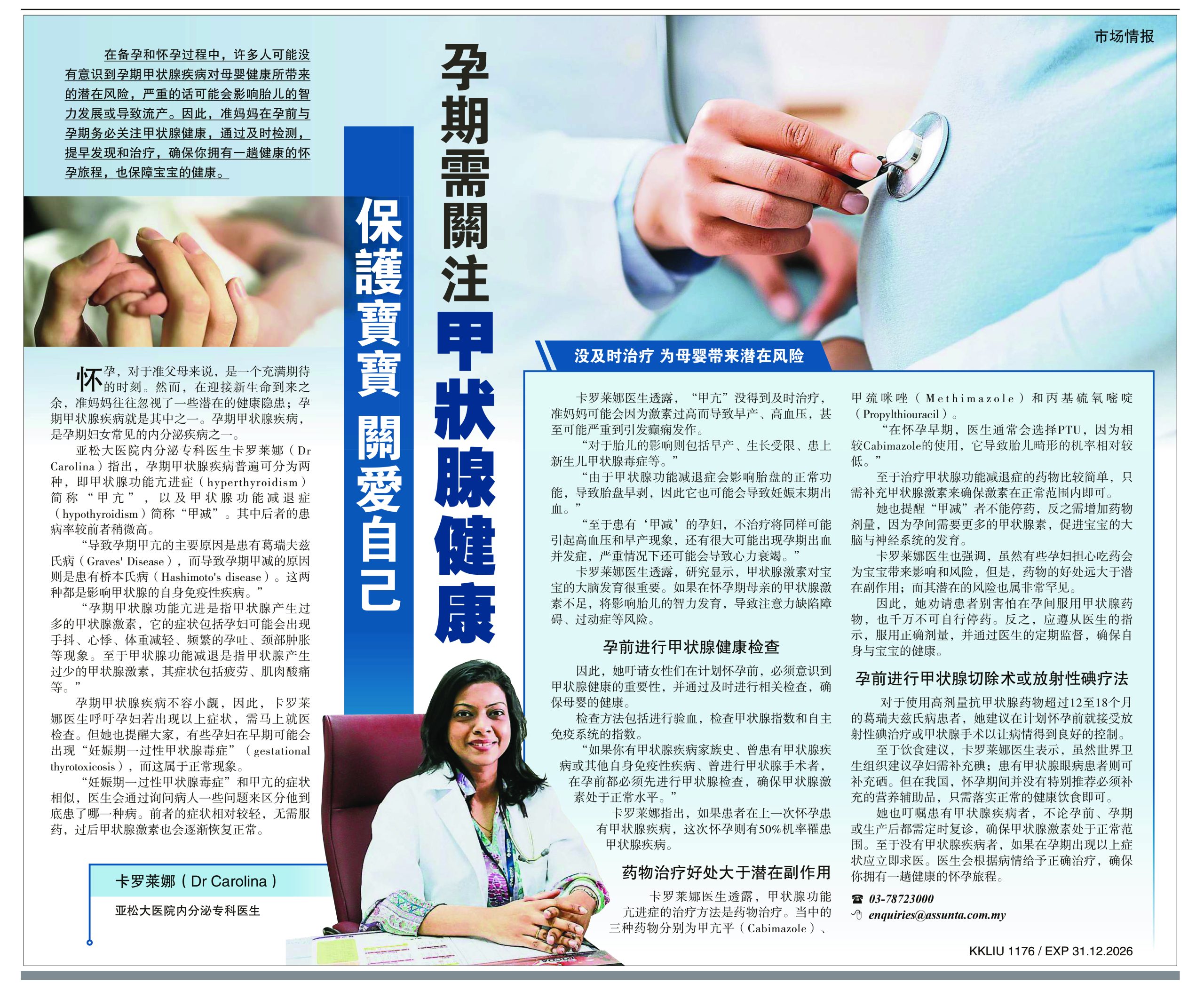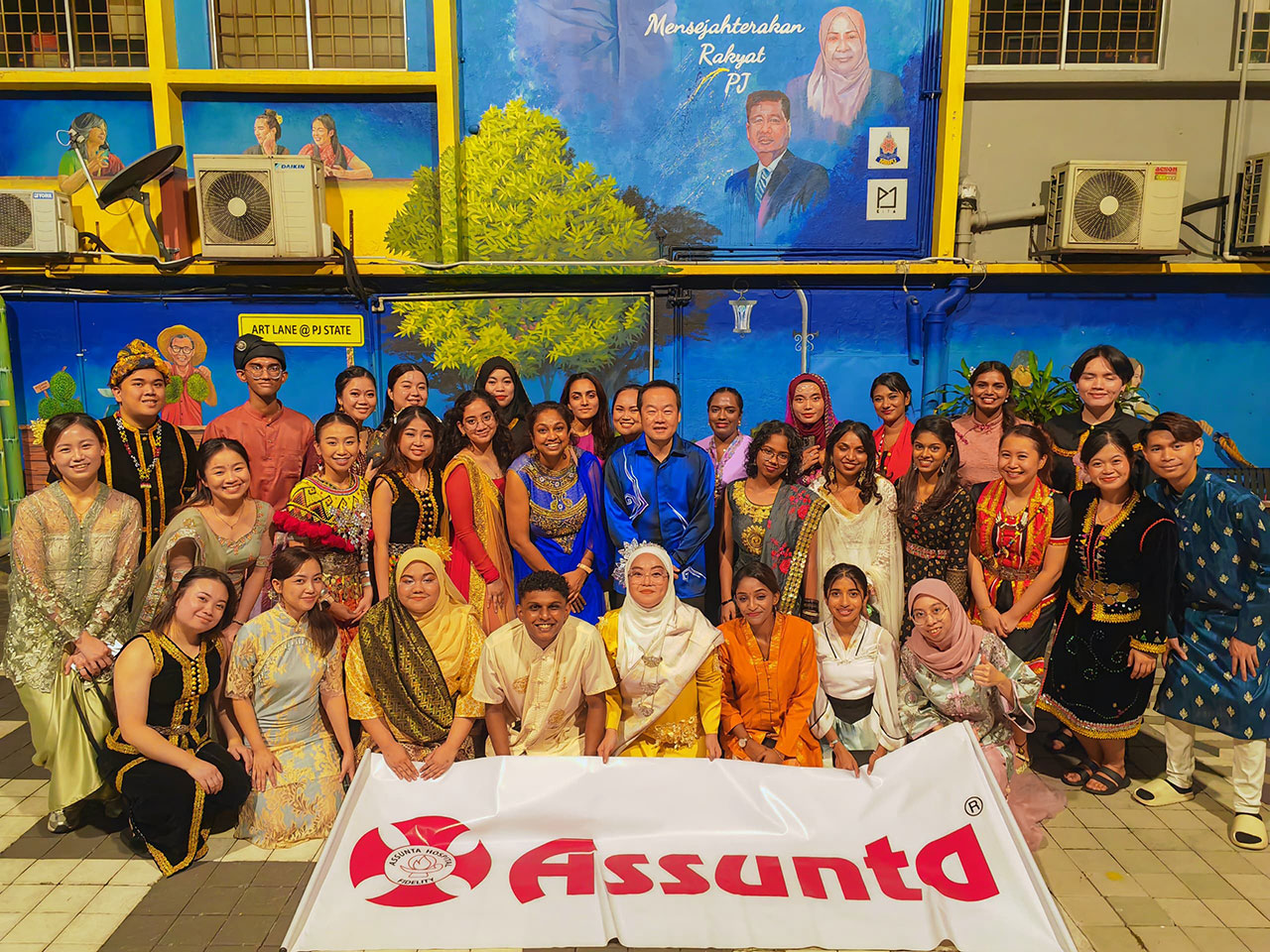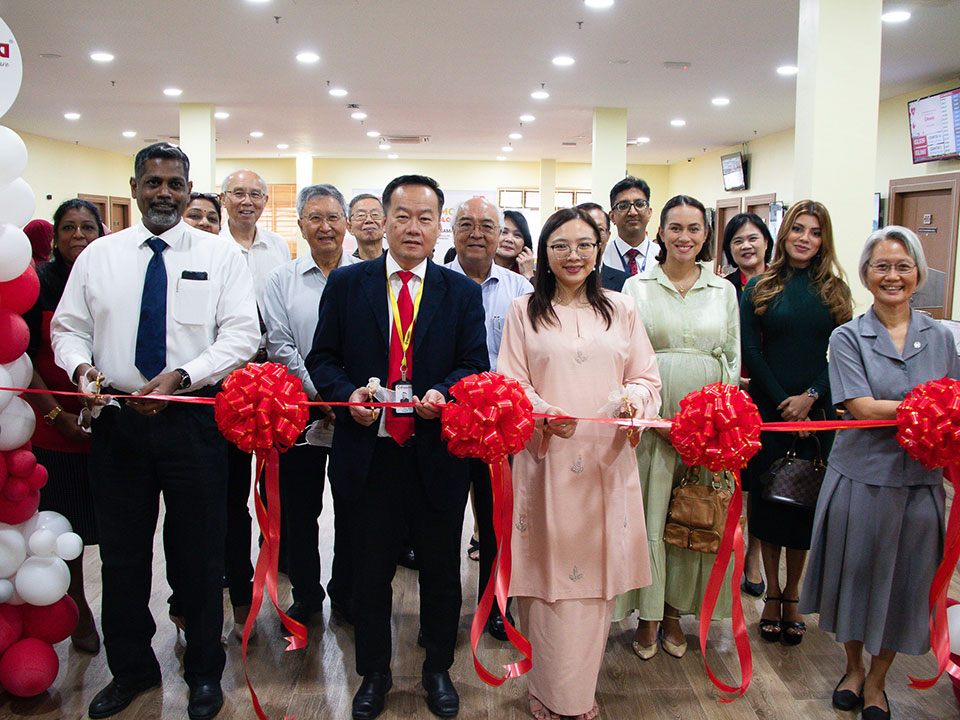Assunta Hospital’s charity arm team takes small steps to make medical care accessible to the poorest of Malaysia’s poor
- Updated on: July 27, 2023

KUALA LUMPUR, July 22 — Working in a mobile clinic at six different locations six days a week is no easy feat as it means travelling to 24 different locations, with only four days of rest in a month.
Exhausting as it sounds, Edeena Marcellena Engel looks forward to each new day as a staff nurse with the mobile clinic under Assunta Integrated Social Services (ASSISS), the charity arm of Assunta Hospital that provides medical aid for patients whose household income totals RM2,500 and below.
“There are two teams. We are Team A — one doctor, and four nurses. The four nurses will rotate tasks between registration, screening and medicine dispensing.
“For me, I joined the team because of my interest in medicine. I like handling medicine,” the 27-year-old told Malay Mail in a recent interview.

However, she said that when she was a nurse based in a hospital, she didn’t have the authority to dispense medication.
“So it’s a very different experience with the mobile clinic,” she added.
For Edeena, a Sabahan, each day in the mobile clinic brings a different kind of “adventure”.
She recalled one case in particular that got her heart and that of another colleague’s pumping.
While on duty in a residential neighbourhood, the two staff nurses were asked to provide cardiopulmonary resuscitation (CPR) to a person nearby who suddenly lost consciousness.
“The person who fainted was not a patient of the mobile clinic, but we were the only ones closest to them at the time, and in a panic they came to us.
“We dropped everything and ran to where the person had fainted and under the hot scorching sun we gave the person CPR,” she said.
Edeena said that incident taught them that they had to be ready to provide medical help at a moment’s notice as they were frontline medical staff.

Running a mobile clinic
One of the more challenging parts of running the mobile clinic is interviewing patients to determine if they are eligible to accept treatment at the mobile clinic, Edeena said.
“It isn’t easy to just start a conversation about someone’s household income, it’s such a sensitive question, and having to explain this in certain languages that we are not familiar with is tough. These are some of the screenings we have to do before a person is actually sent to the doctor for a consultation.
“At the same time, I feel bad about turning people away. But we do have to turn people away if their condition requires specialist treatment. The mobile clinic only treats minor illnesses,” she said, adding that her team will refer patients who need more complicated procedures like an operation to a hospital for treatment.
Edeena said her team’s day starts at about 7am and though the mobile clinic packs up at about noon, their work doesn’t end there.
Her colleague, staff nurse Valarmathi Magendran said the team heads back to the office to prepare for the next day.
“That includes packing of medicine, checking on the next day’s location, and when we are done it will be about 5pm.
“It does sound tiring, but I was working in the hospital for four years, and I think it’s time to go out and interact with the outside world.
“I wanted a less routine job, as when we are in the hospital, we are responsible for the long-term care of a patient, we see the same patient every day.
“However when we’re outside, there are new stories and experiences shared each day, I quite like that,” the 26-year-old Valarmathi said.
At 23, Muhammad Anif Fathi Abdul Rahim is not only the youngest teammate but also the newest and eagerly looked forward to being part of the mobile clinic crew.
He told Malay Mail that dealing with different patients outside the hospital grounds each day gave him a different perspective of how he could contribute to the medical fraternity.
But he was forced to take a break from the mobile clinic just a month after joining because he met with an accident.
“It didn’t stop me from being part of the team even though I was office-bound. Although I was in the office, I was placed in charge of looking for eligible recipients of medical aid by ASSISS.
“It has kept me motivated, and even when I’m not on the ground, I’m assisting the team in different areas,” he said.
Muhammad Anif added he liked the regular hours that being part of the ASSISS team entailed as there was no shift work.
“Certain individuals prefer working shifts, I just didn’t enjoy it. So when I heard about this, I applied for it.
“I wanted a less chaotic sleeping schedule but at the same time still able to contribute to the medical industry as a nurse,” he said.
How ASSISS started
Head of medical services at Assunta Hospital who leads ASSISS, Dr Darshinia Ballasingam said the charity arm was established to reach out to the underprivileged with programmes, including free healthcare for the poorest of the poor.
This included pastoral care, mobile clinics, social welfare inpatient or outpatient, wound care services, stroke ancillary programme, geriatric enrichment services, and palliative services.
The mobile clinic, started in 2019, is one of the eight components under ASSISS that provides health consultations and monitoring of chronic medical conditions such as diabetes as part of the basic primary care.
“Initially, ASSISS focused on providing holistic medical care, covering various aspects such as wound care, palliative care, geriatric care, in-patient surgeries, outpatient consultations, and mobile clinics.
“This comprehensive approach ensured that individuals received the necessary support to address their medical needs,” Dr Darshinia said in an e-mail interview with Malay Mail.
However, she said the Covid-19 pandemic and the increasingly high living costs shifted the direction of ASSISS.
Dr Darshinia said the pandemic highlighted the critical importance of community care and underscored the need for accessible medical services outside a hospital setting.
“This shift in economic circumstances made ASSISS even more necessary, as a significant portion of the population required support for their medical expenses.
“To address these evolving challenges, ASSISS adjusted its priorities and criteria. The organisation recognised the need to focus on supporting the medical expenses of those within the B40 who are among the most economically vulnerable in the community.
“By doing so, ASSISS ensured that medical services remained accessible to all, regardless of their financial circumstances,” she said.
That said, Dr Darshinia said there is an equal demand across the various services offered by ASSISS.
She explained that patients often require multiple types of aid simultaneously, such as wound care, palliative care, physiotherapy, and more.
“The diverse needs of patients and the interplay between different medical conditions necessitate a holistic approach to healthcare.
“Patients may require wound care for healing injuries, palliative care for managing pain and symptoms, and physiotherapy to improve mobility and physical function, for example,” she said.
Future of ASSISS
Dr Darshinia said ASSISS strives to fill the gaps that may arise in the medical sector even though it is difficult to predict the future.
“The ultimate goal is to work towards reducing the need for medical assistance through improvements in public health and healthcare accessibility.
“We hope to contribute to broader efforts in the healthcare sector to address systemic issues, promote preventive measures, and improve overall health outcomes.
“Ideally, as the healthcare system evolves and progresses, there will be advancements that result in better access to holistic medical care for all individuals, regardless of their socioeconomic status. This would involve addressing the underlying factors that contribute to health disparities and working towards a more equitable healthcare system,” she said.
She added that it is important to acknowledge that challenges and gaps within the medical world may persist due to various factors such as economic disparities, limited resources, and complex social issues.
“In such a context, programmes like ASSISS play a crucial role in filling these gaps and ensuring that the most vulnerable members of the community have access to the medical aid they require.
“While the long-term vision is to see a reduced need for medical assistance as a sign of improvement, the reality may be that there will always be individuals and communities who require additional support and specialised services.
“We will try our best to address these needs and provide essential medical aid to those who need it the most, regardless of the broader healthcare landscape,” she said. Working with ASSISS has been a transformative experience, Dr Darshinia said and recalled one case that significantly changed her outlook on how to provide medical care.
It was a senior citizen who had endured fourth-stage venous ulcers in both legs for seven long years. She was a widow and had no immediate family and relied on a small pension for her basic needs.
A venous ulcer is an open sore that takes a longer time than usual to heal due to blood circulation problems.
“Her mobility was severely limited due to the prolonged ailment, and for dressing procedures, she relied on the kindness of neighbours and compassionate individuals who were willing to transport her to the nearest government clinic.
“Unfortunately, the availability of assistance was inconsistent, making the healing process immensely challenging for the numerous consulting doctors who had previously tried to help,” Dr Darshinia said.
But with four months of dedicated wound care provided by ASSISS, Dr Darshinia shared that the patient’s venous ulcers have healed completely, enabling the latter to regain her mobility.
“However, this entire journey of consultation and treatment has continuously reminded me of the restrictive nature of life for the underprivileged. It has made me acutely aware of the struggles they face, even when it comes to accessing basic medical care.
“This humbling experience has instilled in me a greater appreciation for the blessings in my own life. It has also opened our eyes to the pressing needs within the community and increased our attentiveness to those needs,” Dr Darshinia said.
For further details on ASSISS, go to www.assunta.com.my/assiss.
Related Articles











